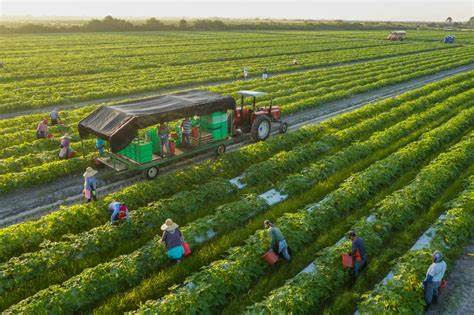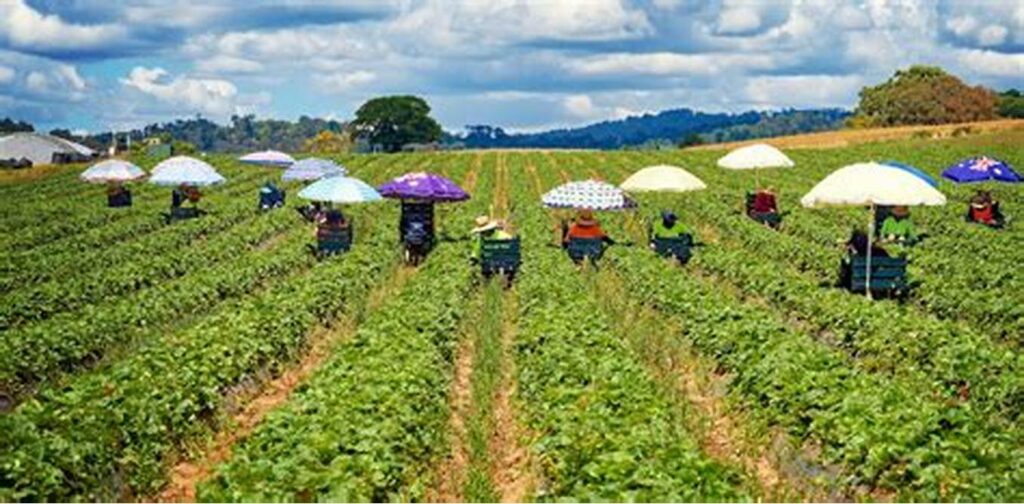INTRODUCTION:
The agriculture syllabus of UPSC covers the importance of agriculture in the Indian economy, crop production and management techniques, soil health and fertility, water resource management, agricultural marketing, and trade policies. Candidates are expected to understand agronomic principles, agricultural finance, extension services, and environmental sustainability. The syllabus also includes topics such as animal husbandry, agroforestry, rural development, and international trade agreements relevant to agriculture, preparing candidates comprehensively for the examination.

Importance of Agriculture Syllabus:
- Scope: The agriculture syllabus of UPSC encompasses various dimensions of agriculture, reflecting its significance in the Indian economy and society.
Key Topics in the Agriculture Syllabus:
- Importance of Agriculture in the Indian Economy: Understand the multifaceted role of agriculture, including its economic, social, and developmental aspects.
- Crop Production and Management: Familiarize yourself with diverse crop varieties, cultivation techniques, and management practices to enhance productivity sustainably.
- Soil Health and Fertility: Grasp the significance of soil conservation, organic farming, and soil testing methodologies to ensure long-term agricultural sustainability.
- Water Resource Management: Acquire knowledge about irrigation methods, water conservation strategies, and challenges associated with water management in agriculture.
- Agricultural Marketing and Trade: Comprehend the dynamics of agricultural marketing, pricing mechanisms, market infrastructure, and government policies shaping agricultural trade.
Importance of Agriculture in Indian Economy:
- Role of agriculture in the national economy
- Contribution to employment generation
- Food security and nutritional aspects
- Rural development and poverty alleviation
Agronomic Principles and Crop Production:
- Principles of crop rotation, multiple cropping, and intercropping
- Factors affecting crop production
- Modern agricultural practices and their applications
- Agronomic practices for major crops (e.g., cereals, pulses, oilseeds, vegetables, fruits)
Agricultural Marketing and Trade:
- Marketing concepts and their application in agriculture
- Agricultural pricing policies
- Market infrastructure and its significance
- Government interventions and support measures for agricultural marketing
Soil Science and Soil Conservation:
- Soil formation, classification, and properties
- Soil erosion and conservation methods
- Soil fertility, organic matter, and nutrient management
- Sustainable soil management practices
Water Resource Management:
- Importance of water in agriculture
- Irrigation methods and techniques
- Water conservation strategies
- Challenges and solutions in water resource management
Agricultural Finance and Insurance:
- Sources of agricultural finance
- Role of banks and financial institutions in agriculture
- Crop insurance schemes and their significance
- Risk management in agriculture
Agricultural Extension:
- Role of agricultural extension in disseminating information
- Farmer education and training programs
- Technologies for agricultural extension
- Extension services and their delivery mechanisms
Agricultural Research and Education:
- Agricultural research institutions in India
- Research methodologies and techniques
- Importance of agricultural education and training
- Recent advancements in agricultural research
Agroforestry and Agroecology:
- Concepts and principles of agroforestry
- Importance of agroecology in sustainable agriculture
- Agroforestry systems and their benefits
- Integration of trees and crops for enhanced productivity and sustainability
Environmental Issues in Agriculture:
- Impact of agriculture on the environment
- Sustainable agricultural practices
- Climate change adaptation and mitigation strategies in agriculture
- Biodiversity conservation in agricultural landscapes
Government Policies and Schemes:
- Government initiatives for agricultural development
- Subsidies, incentives, and support programs for farmers
- National agricultural policies and their objectives
- Role of government agencies in agricultural administration
Candidates preparing for UPSC examinations should study these topics comprehensively to ensure a thorough understanding of the agriculture syllabus. Additionally, staying updated with current affairs and recent developments in agriculture is crucial for success in the examination.
Animal Husbandry:
- Principles of animal husbandry and livestock management
- Breeding techniques and genetic improvement in livestock
- Livestock health management and disease control measures
- Dairy farming, poultry farming, and other allied activities
Agricultural Biotechnology and Genetic Engineering:
- Applications of biotechnology in agriculture
- Genetically modified crops and their implications
- Biotechnological interventions for crop improvement and pest management
- Biosafety regulations and ethical considerations
Agricultural Policy and Planning:
- Objectives of agricultural policy in India
- Role of planning in agricultural development
- Challenges and constraints in agricultural planning
- Evaluation of agricultural policies and their impact
Rural Development and Agri-Entrepreneurship:
- Rural development programs and schemes
- Role of agriculture in rural economy
- Agri-entrepreneurship opportunities and challenges
- Skill development and capacity building in rural areas
Food Processing and Value Addition:
- Importance of food processing in agriculture
- Techniques and methods of food preservation
- Value addition in agricultural produce
- Government initiatives to promote food processing industries
International Trade and WTO:
- International trade agreements related to agriculture
- WTO agreements and their implications for Indian agriculture
- Export promotion and market access for agricultural products
- Trade disputes and negotiations in the agriculture sector
Sustainable Agriculture and Climate Resilience:
- Principles of sustainable agriculture
- Climate-resilient agricultural practices
- Adaptation strategies for climate change impacts
- Role of farmers and institutions in promoting sustainable agriculture
Gender Issues in Agriculture:
- Gender roles and responsibilities in agriculture
- Gender disparities in access to resources and benefits
- Women empowerment in agriculture
- Policies and programs for gender mainstreaming in agriculture
Understanding these topics in depth and their interconnections is essential for candidates aspiring to excel in the UPSC examination. Additionally, candidates should focus on developing analytical and critical thinking skills to address complex issues related to agriculture and rural development effectively.
Moreover, integrating current affairs, case studies, and practical examples into the preparation process can enhance understanding and retention of key concepts. Continuous revision, practice of mock tests, and seeking guidance from subject matter experts can further strengthen preparation efforts for the agriculture section of the UPSC examination.
By adopting a holistic approach and maintaining a structured study regimen, candidates can navigate through the agriculture syllabus of UPSC with confidence and competence, ultimately contributing to their success in the examination.
Agricultural Mechanization and Technological Innovations:
- Role of mechanization in modern agriculture
- Farm machinery and equipment
- Technological innovations in agriculture (e.g., precision farming, drones, IoT)
- Adoption challenges and benefits of agricultural technology
Land Reforms and Land Tenure Systems:
- Historical perspective of land reforms in India
- Land tenure systems and their implications for agriculture
- Land consolidation and redistribution policies
- Issues of land ownership, landlessness, and land conflicts
Organic Farming and Sustainable Agriculture Practices:
- Principles and practices of organic farming
- Certification processes and standards for organic produce
- Benefits and challenges of organic farming
- Integration of organic farming with conventional agriculture practices
Food Security and Nutrition:
- Concepts and indicators of food security
- Government initiatives for ensuring food security
- Malnutrition and its socio-economic impacts
- Nutrition-sensitive agriculture interventions
Agri-Business and Value Chains:
- Agri-business models and entrepreneurship opportunities
- Value chain analysis in agriculture
- Market linkages and value addition opportunities
- Challenges and strategies for enhancing agri-business competitiveness
Disaster Management in Agriculture:
- Risk assessment and mitigation strategies for agricultural disasters (e.g., droughts, floods, pests)
- Early warning systems and preparedness measures
- Relief and rehabilitation efforts in agriculture
- Role of technology and community participation in disaster management
Urban and Peri-Urban Agriculture:
- Urban agriculture practices and challenges
- Rooftop gardening, community gardens, and urban farming initiatives
- Contribution of peri-urban agriculture to urban food security
- Policy interventions and regulatory frameworks for urban agriculture
Integrated Farming Systems:
- Concepts and components of integrated farming systems
- Crop-livestock integration and synergies
- Agroforestry and aquaculture integration
- Benefits and sustainability of integrated farming approaches
Sustainable Development Goals (SDGs) and Agriculture:
- Alignment of agricultural policies and practices with SDGs
- Role of agriculture in achieving SDG targets (e.g., zero hunger, clean water and sanitation, climate action)
- Policy coherence and integrated approaches for sustainable development
Understanding these additional topics and their relevance to agriculture and rural development is vital for comprehensive preparation for the UPSC examination. Candidates should approach the syllabus with a multidisciplinary perspective, integrating knowledge from various disciplines such as economics, sociology, environmental science, and public policy.
Furthermore, staying updated with emerging trends, research findings, and policy developments in the field of agriculture is essential for informed decision-making and effective problem-solving during the examination.
By adopting a proactive and holistic approach to study, candidates can navigate through the diverse and dynamic landscape of the agriculture syllabus of UPSC with confidence and proficiency, thereby maximizing their chances of success in the examination.
Agro-Economic Issues:
- Understanding the economic dynamics of agriculture
- Agricultural subsidies and their impact on farmers and the economy
- Price support mechanisms and their implications
- Income inequality and poverty alleviation in rural areas
Agricultural Policy Evaluation:
- Analyzing the effectiveness of agricultural policies and programs
- Impact assessment of government interventions in agriculture
- Policy recommendations for enhancing agricultural productivity and sustainability
- Stakeholder consultation and participatory approaches in policy formulation
Extension Education and Rural Development:
- Role of agricultural extension services in rural development
- Farmer education and training programs
- Technology dissemination and adoption strategies
- Participatory approaches in rural development planning
Food and Nutrition Security Programs:
- National food security initiatives (e.g., Public Distribution System, Mid-Day Meal Scheme)
- Nutrition-specific interventions for vulnerable populations
- Monitoring and evaluation of food and nutrition security programs
- Community-based approaches to address malnutrition
Gender and Social Inclusion in Agriculture:
- Gender-responsive agricultural policies and programs
- Women’s participation and empowerment in agriculture
- Social inclusion of marginalized communities in rural development
- Intersectionality of gender, caste, class, and ethnicity in agriculture
Agri-Environmental Management:
- Sustainable land use planning and natural resource management
- Environmental impacts of agricultural practices (e.g., land degradation, water pollution)
- Climate-smart agriculture and adaptation strategies
- Environmental conservation and biodiversity conservation in agricultural landscapes
Technological Innovations in Agriculture:
- Digital agriculture and precision farming technologies
- Use of remote sensing and GIS in agricultural resource management
- Adoption of biotechnological tools for crop improvement and pest management
- Challenges and opportunities of emerging technologies in agriculture
International Agreements and Trade Policies:
- Multilateral trade agreements related to agriculture (e.g., WTO agreements)
- Bilateral and regional trade agreements impacting agricultural exports and imports
- Trade disputes and negotiations in the agriculture sector
- Compliance with international food safety and quality standards
Agri-Entrepreneurship and Start-ups:
- Entrepreneurial opportunities in agriculture and allied sectors
- Incubation support and funding mechanisms for agri-start-ups
- Business models for agricultural value chain enhancement
- Role of innovation hubs and accelerators in promoting agri-entrepreneurship
Rural Infrastructure Development:
- Rural infrastructure projects (e.g., roads, electrification, irrigation)
- Access to markets and transportation facilities for rural producers
- Technology-enabled solutions for rural connectivity and service delivery
- Public-private partnerships in rural infrastructure development
By covering these diverse topics comprehensively, candidates can develop a holistic understanding of agriculture and rural development issues, which is essential for excelling in the UPSC examination. It’s important for aspirants to engage with current affairs, case studies, and real-world examples to contextualize their learning and develop analytical and problem-solving skills.
Moreover, continuous self-assessment, revision, and practice of previous year question papers are key strategies for effective exam preparation. With diligent effort and a strategic approach, candidates can navigate through the agriculture syllabus of UPSC successfully and emerge as informed and capable professionals in the field of agriculture and rural development.
CONCLUSION:
In conclusion, the UPSC agriculture syllabus encompasses a wide array of topics crucial for understanding India’s agricultural landscape. From crop production and soil health to rural development and international trade agreements, candidates gain insights into various dimensions of agriculture. By mastering these concepts, aspirants are equipped to address challenges, promote sustainability, and contribute effectively to the agricultural sector’s growth and development, reflecting the syllabus’s comprehensive nature and relevance.

For Detailed Information ; CLICK HERE
For the 2024 UPSC Calendar; CLICK HERE